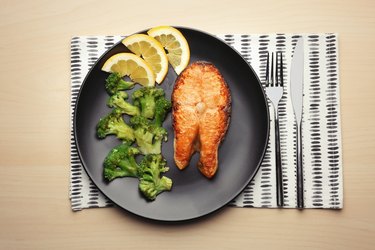
Keto has taken the diet and weight-loss world by storm: It seems like everyone knows someone who's on the ketogenic diet or has at least experimented with some keto-friendly recipes. One reason the diet is so popular is that, according to keto lore, counting calories isn't necessary.
Instead, people on ketogenic diets are told to keep track of their carbohydrate intake, and limit net carbs (a measure of total carbs minus fiber and sugar alcohols) to 5 to 10 percent of their daily calorie intake. In general, that translates to 20 to 50 grams of net carbs per day.
Video of the Day
Video of the Day
But do calories really not matter on a ketogenic diet? Not completely, says Amy Goss, PhD, a registered dietitian and assistant professor of nutrition sciences at the University of Alabama at Birmingham. If you're trying to lose weight, you'll still need to make sure you're burning more energy than you're consuming every day.
How Ketosis Affects Metabolism
So how much energy is that, exactly? It varies from person to person, based on physical activity level, age, height, weight and metabolism. And metabolism can be affected by many things, including a person's diet.
Some research suggests that going keto can boost your rate of calorie burning, but there's not a scientific consensus. "It's still up in the air whether or not your metabolic rate is higher on a ketogenic diet versus any other type of diet," Goss says. "Some studies have found that people burn around 250 more calories a day while in ketosis, while others say there's not much of a difference."
Since the jury is still out, Goss doesn't recommend counting on a hyper-revved metabolism to burn off excess calories you wouldn't have eaten otherwise. Instead, she recommends aiming for a daily calorie count in a normal, healthy range.
According to U.S. Dietary Guidelines, moderately active men should consume between 2,200 and 2,800 calories a day in order to maintain calorie balance (in other words, not gain or lose weight), while moderately active women should consume between 1,800 and 2,200. Sedentary men and women should aim for fewer calories, while very active people can allow themselves more.
If you want to lose weight, you'll have to consume less than you're already eating. For healthy, sustainable weight loss, experts generally recommend cutting out 500 calories a day from your current diet to lose about a pound a week.
Do You Have to Count Calories?
Ketogenic diets generally don't give rules for calories, although they might give suggestions. For example, the Atkins 20 Diet — one of the most well-known ketogenic diets — recommends that women aim for 1,500 to 1,800 calories a day, while men aim for 1,800 to 2,200. It also advises dieters to limit empty calories and to stick to a list of approved foods for each phase of the diet.
Read more: Should You Count Carbs or Calories to Lose Weight?
One good thing about a ketogenic diet, says Franziska Spritzler, RD, author of The Low-Carb Dietitian's Guide to Health and Beauty, is that most people will naturally stay within this calorie range while on the plan. While it's easy to fill up on empty carbs like crackers and cookies, she says, those foods are off limits on a keto diet. It's more difficult to eat large portions of keto-approved foods that are higher in fat, protein and fiber.
"You're going to be eating veggies, which are high in fiber and can fill you up on very few calories," she says. "And you're also going to be eating things like nuts and meat and cheese and oil — which, yes, are high in calories, but they're also very satiating, so you really only have to eat small portions to get your fill."
That being said, if you find you do have a tendency to overeat or get carried away with calorie-dense foods like cheese — or you're following a ketogenic diet and you're not losing weight — it may be smart to start paying closer attention to your daily calorie consumption, Goss says. It's also important to remember that keto is not a license to eat unlimited quantities of low-carb foods or to forget about calories entirely.
- University of Alabama at Birmingham Nutrition Obesity Research Center: "Amy Miskimon Goss, PhD"
- The BMJ: "Effects of a Low Carbohydrate Diet on Energy Expenditure During Weight Loss Maintenance: Randomized Trial"
- Dietary Guidelines 2015-2020: "Appendix 2. Estimated Calorie Needs per Day, by Age, Sex, and Physical Activity Level"
- Atkins.com: "Atkins 20 Low Carb Diet Facts"